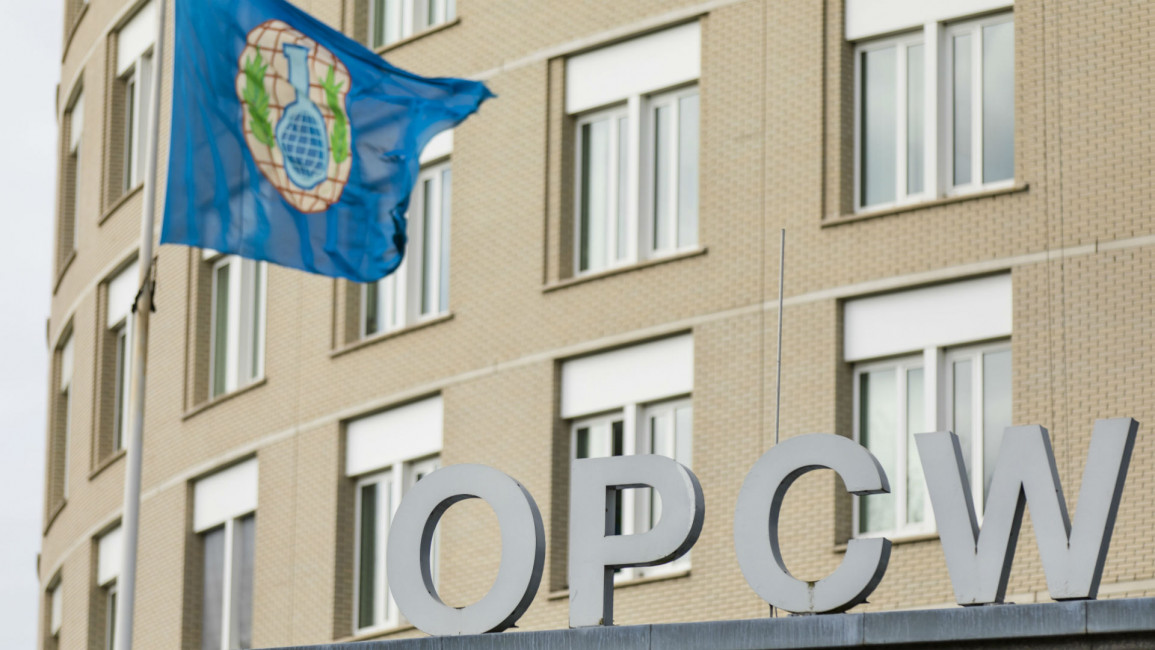OPCW 'whistleblower' may have suppressed evidence showing that Syria chemical weapon attack happened
The investigative journalism website Bellingcat says that it has seen a letter proving that a 2018 chemical weapons attack in the city of Douma did in fact take place, casting severe doubts on the contrary claims made by an OPCW whistleblower and Wikileaks.
In 2019, a former OPCW employee named Brendan Whelan, codenamed 'Alex', who had been part of the team investigating the Douma attack, leaked internal OPCW memoranda saying that he and another employee from the agency, Ian Henderson, had come to the conclusion that the regime had not used chemical weapons in Douma and that the attack had been staged.
Whelan's memorandum provided fuel to a vast Russian government-backed campaign that alleges the Douma attack did not happen.
It also sought to discredit the OPCW, a UN organisation, as untrustworthy and biased towards Western countries.
Russia is a key ally of Syrian dictator Bashar al-Assad and intervened in the conflict on his side in 2015.
Syria Insight: Russia’s Intervention Five Years On
After the chemical weapons attack on Douma, the US, France, and the UK responded with a non-lethal airstrike on regime laboratories in Damascus which did little damage to the Assad regime's military capabilities.
In October 2019, Whelan presented "evidence" regarding the Douma attacks to a panel convened by the Courage Foundation, an organisation associated with Wikileaks.
Whelan's memorandum was also promoted by Western journalists including The Independent’s Robert Fisk, The Daily Mail's Peter Hitchens, and Grayzone’s Aaron Mate.
Last week, veteran leftist American intellectual Noam Chomsky added his voice to the anti-OPCW campaign, saying that it was "shocking" that the agency had "suppressed" information stating that the regime chemical attack on Douma had not happened.
However, the letter Bellingcat found suggested that Whelan and Wikileaks had done a little suppressing of their own.
OPCW response to Whelan
The letter was a written in June 2019, four months before the Courage Foundation panel convened. It was a reply to an earlier letter sent by Whelan in which he claimed the chemical attack was staged and was drafted by a number of OPCW members and sent by the organisation’s director-general, Fernando Arias.
|
|
Whelan was only briefly part of the team investigating the Douma chemical attack. In the OPCW response, the organisation informed him that his assumption that the chemical attack didn't happen because since he had left the OPCW, a new technique had been developed to check for traces of chlorine gas. This had allowed the OPCW to determine that chlorine gas had indeed been used in the attack in Douma.
"One of the Designated Laboratories that analysed samples after you completed your tenure has developed methods or analysing wood exposed to chlorine gas that can distinguish between different types of wood in the signatures of chlorinated compounds produced. This laboratory's analysis of wood samples taken from Douma indicated that the wood indeed had been exposed to chlorine gas," the OPCW told Whelan.
No Mention of Response
Wikileaks did not make any mention of the letter before Whelan's appearance at the panel. When Bellingcat approached Wikileaks and the members of the Courage Foundation’s panel for comment, they did not respond.
Last month, Whelan testified at the UN at the Russian government's invitation, once again alleging that the Douma attack was staged and making no mention of the OPCW response to his claims.
The OPCW’s mandate does not include assigning responsibility for chemical attacks or determining how civilians died. It is simply tasked with determining if chemical weapons have been used.
However, despite Russia's campaign against the OPCW, the organisation's letter to Whelan says that neither Russia nor the Syrian regime have in fact denied the OPCW's assertion that a chemical attack.
"I would further like to point out that the conclusion of the final Douma report is not in question. No State Party has questioned the conclusion that there are reasonable grounds to believe that a toxic chemical was used as a weapon in Douma," Arias writes to Whelan.
"This includes the Syrian Arab Republic and the Russian Federation, which in recent weeks have each sent us comments and questions on the final Douma report in notes verbale in which they themselves have indicated their agreement with the conclusion of the final report."
Russian and Russian-inspired disinformation campaigns have been a constant feature of the Syrian conflict, particularly since Moscow militarily intervened in the country in 2015.
The conflict has seen over 500,000 people killed since 2011, mostly as a result of regime bombardment of civilian areas.
Follow us on Facebook, Twitter and Instagram to stay connected



